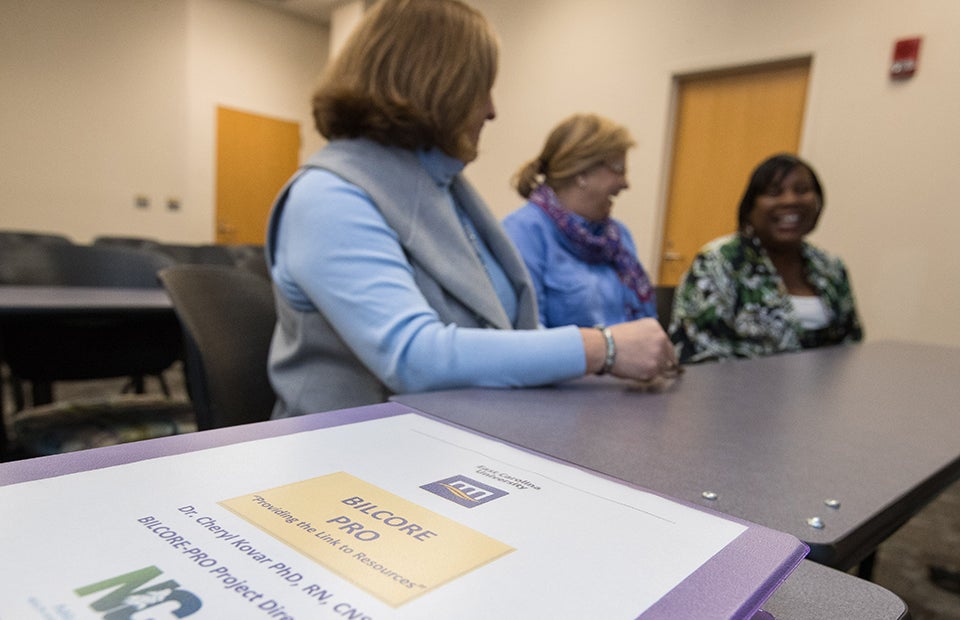BILLING BOOSTER
Project provides resources for sexual health providers statewide
A project at East Carolina University’s College of Nursing is helping health departments and other health care providers ensure the availability of screening and treatment for sexually transmitted diseases.
Cheryl Kovar, director of the nursing leadership concentration in the College of Nursing, heads up the project, which is funded through a grant from the Centers for Disease Control through the N.C. Department of Health and Human Services.
The BILCORE-PRO project focuses on billing, coding and seeking reimbursement from third-party payers for STD services at the local level.
Health departments have historically done STD screening, testing and treatment at the local level, Kovar said, and a state statute prohibits them from billing patients for those services but allows for third-party payers to be billed.
“Typically that has been Medicaid,” she said. “What they have not been as comfortable with … is billing a commercial insurance company such as Blue Cross Blue Shield.”
With the advent of the Affordable Care Act and more than 500,000 North Carolinians who now have health insurance, Kovar said the health departments needed help ensuring that they’re billing properly for their services. The project began in 2015 with a survey of 25 health departments, 13 Federally Qualified Health Centers (FQHC) and two emergency departments in eastern North Carolina.
“We wanted to find out which agencies were billing, which ones weren’t, who had contracts, who didn’t, how long were the contracts, just to see what was going on,” Kovar said. “Then in the second year, (project manager Susan Bynum) went out and did an interview with selected staff members at these agencies … to look at their barriers to billing and coding, and to being reimbursed.”
Each agency had its own set of challenges, Bynum said.
“Each one of these health departments is negotiating their own contract (with the health insurance company),” she said. “Some of them are savvy at that, but for many it’s totally foreign because that has really not been their model. Most of them have just never thought of it in those terms.”
The interviews also focused on determining the level and effectiveness of collaboration between the different agencies in each county.
Finally, each agency received a tool kit – a customized, comprehensive guidebook with background information on how to bill for services, sample contracts and other useful information. The BILCORE-PRO project is also helping provide staff training and other resources for the health care agencies.
With the renewal for the third year of the grant, the total funding is approaching $800,000. Those funds have been directly targeted at public health, Kovar said. This year, the team will be taking the project statewide, replicating what it has done in the east with the remaining counties in North Carolina.
“We know STDs are prevalent,” she said. “The latest data reported approximately 20 million new STD cases occur each year in the U.S., and the cost has been estimated at $1.6 billion. It’s costly, and there are personal consequences as well, such as infertility.
“So it’s important to maintain the availability of STD screening, because it’s the only way for someone to know if they have an STD.”
Jacquelyn Clymore, HIV/STD/Hepatitis director for the N.C. Division of Public Health’s Communicable Disease Branch, said the program is making a difference at the local level.
“It’s all about increasing access to STD testing and treatment,” she said. “As more clients gain insurance coverage, local health departments can increase billing to third-party payers and therefore, increase revenue. The increase in revenue allows more access to these services for people who do not have any form of health care coverage. If access is increased, the spread of infection may be decreased, resulting in better health outcomes for clients.”

A grant from the Centers for Disease Control has allowed the team to put together customized workbooks for service providers in eastern North Carolina, and now the effort is going statewide.
